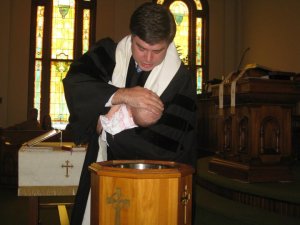I’m working my way through William Gurnall’s, “The Christian in Complete Armour “. While I’m not a new to Puritan writings, I haven’t read extensively either, so I continue to be surprised at how unlike the stereotype puritans the real men actually were. The self-righteous, quick to condemn killjoys of popular thought simply hasn’t emerged from the pages of Richard Baxter, John Owen, Thomas Watson, or William Gurnall. In fact quite the opposite.
“. While I’m not a new to Puritan writings, I haven’t read extensively either, so I continue to be surprised at how unlike the stereotype puritans the real men actually were. The self-righteous, quick to condemn killjoys of popular thought simply hasn’t emerged from the pages of Richard Baxter, John Owen, Thomas Watson, or William Gurnall. In fact quite the opposite.
Take for example the following passage on spiritual pride from The Christian in Complete Armour:
O how uncheerfully, yea, joylessly do many precious souls pass their days! If you inquire what is the cause, you shall find [that] all their joy runs out at the crannies of their imperfect duties and weak graces. They cannot pray as they would, and walk as they desire, with evenness and constancy; they see how short they fall of the holy rule in the Word, and the pattern which others more eminent in grace do set before them; and this, though it does not make them throw the promises away, and quite renounce all hope in Christ, yet it begets many sad fears and suspicions, yea, makes them sit at the feast of Christ hath provided, and not know whether they may eat or not. In a word, as it robs them of their joy, so [it robs] Christ of that glory which he should receive from their rejoicing in him.
In other words, it is sinful spiritual pride to base your joy on your own performance. Here is a masterful surgeon of the soul at work. It might appear very humble and devout to mourn failings in your piety, and Gurnall acknowledges that we should “mourn for those defects thou findest in thy grace and duties”, but to do so without also rejoicing in the Christ who redeemed you in spite of your failures is to look to your own righteousness instead of his. To focus on our failures in this way is to believe that our personal holiness, rather than Christ, is the source of our joy.
O, if thou couldst pray without wandering, walk without limping, believe without wavering, then thou couldst rejoice and walk cheerfully. It seems, soul, thou stayest to bring the ground of thy comfort with thee, and not to receive it purely from Christ.
If our chief end is “to glorify God and to enjoy him forever”, we fail to do so by seeking our joy in ourselves, even our desired righteous and holy selves, instead of Christ. We rob Christ of glory when our hope is in our perfection instead of his.
In thinking about the spirituality characteristic of many churches I have realized many are based on a cycle of guilt and redoubled effort. Too often I hear comments from people that reveal that their spiritual feelings are based on messages or experiences that stir emotions of guilt, most often expressed as “stepping on toes”. Too often I’ve been in worship services where I feel like my will had been absolutely battered and bruised. And all too often the solution is not “rest in Christ”, “trust in His work”, “look at the cross”, but “try harder”, “recommit”, “decide today”. The so called gospel I hear from many pulpits is: Jesus loves you, you’ve failed, return to the Law with stronger effort.
Brother, Sister – If you feel inadequate as a disciple, that you could be a more committed and devoted follower of Christ, you’re right – we all could. Repent, and as Gurnall says, “Christian, even while the tears are in thy eyes for they imperfect graces … thou should rejoice, yea, triumph over all these thy defects by faith in Christ, in whom thou art complete…”


